The Cosmostatistics Initiative (COIN) on Overleaf
Overview
The Cosmostatistics Initiative (COIN) is partnering with Overleaf to provide free Overleaf Professional accounts and LaTeX resources to all members of the COIN community.
Join The Cosmostatistics Initiative (COIN) on Overleaf
COIN members (as at March 12th 2016) who were already using Overleaf have been automatically upgraded to Professional - simply login to Overleaf to start using your upgraded account!
COIN members who were not already using Overleaf should have received an email inviting them to join Overleaf to claim their free upgrade. To claim your upgrade, please click the link in the email. If you have not received an email (please check your spam folder), please let us know and we'll look into it for you.
If you are a new member of COIN, please contact Rafael S. de Souza at rafael.2706@gmail.com to ask to be added to the Overleaf COIN group.
Quick Start
Welcome to your quick start guide to Overleaf. We've put together some useful resources and links in the sections below, and if you have any questions about how to get started please let us know and we'll be happy to help!
You can also read a short interview with one of the COIN and IAA members, Maria L. Dantas, on her experiences with Overleaf on the Overleaf blog.
Intro Videos
Ausgewählte LaTeX-Vorlagen
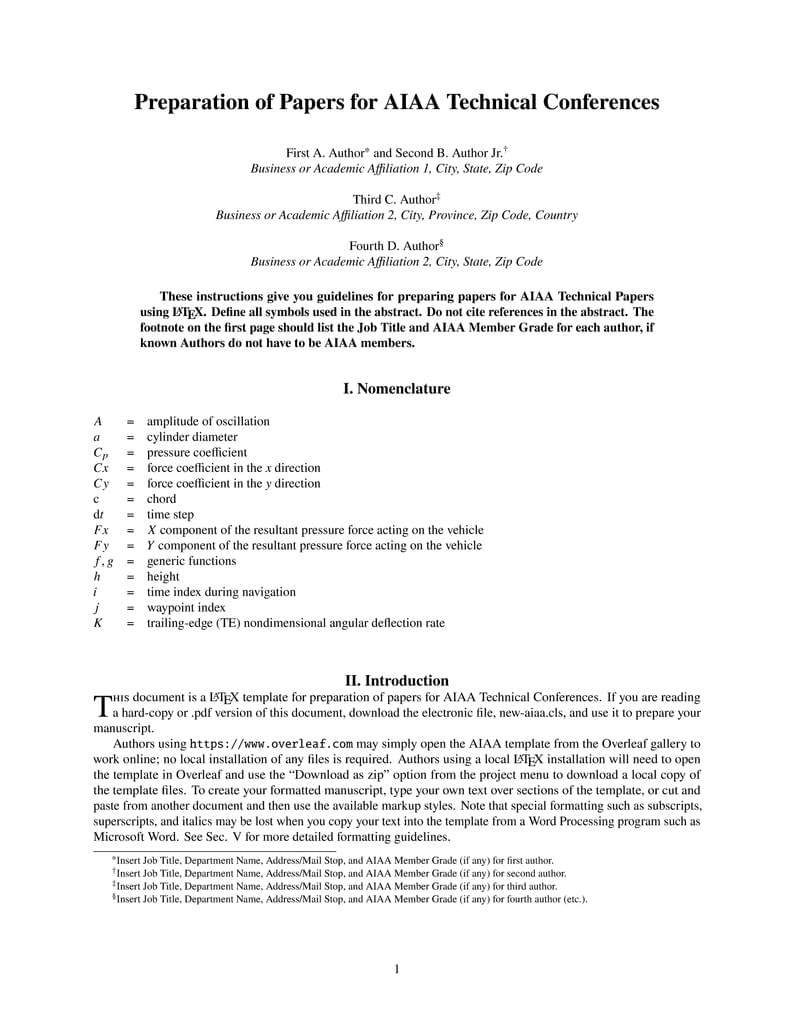
These instructions provide guidelines for preparing papers for AIAA Technical Conferences using LaTeX. AIAA is the catalyst for inspired idea exchange and solutions, a convener of the most original perspectives, and curator of essential research information. For the past 50 years, individuals and teams from around the globe have presented their latest research to their peers at AIAA conferences. To begin writing online (in your browser), simply click the Open as Template button, above. Additional guidelines for preparing your submission are included within the template itself. If you'd like to download any of the template files including the .cls file, please click "Open as template" above, then download the template “Source” zip file from the menu. For a list of AIAA forums and other events currently accepting abstracts, visit the AIAA events listing page. If you're new to Overleaf and LaTeX, check out our free introductory course for help getting started.
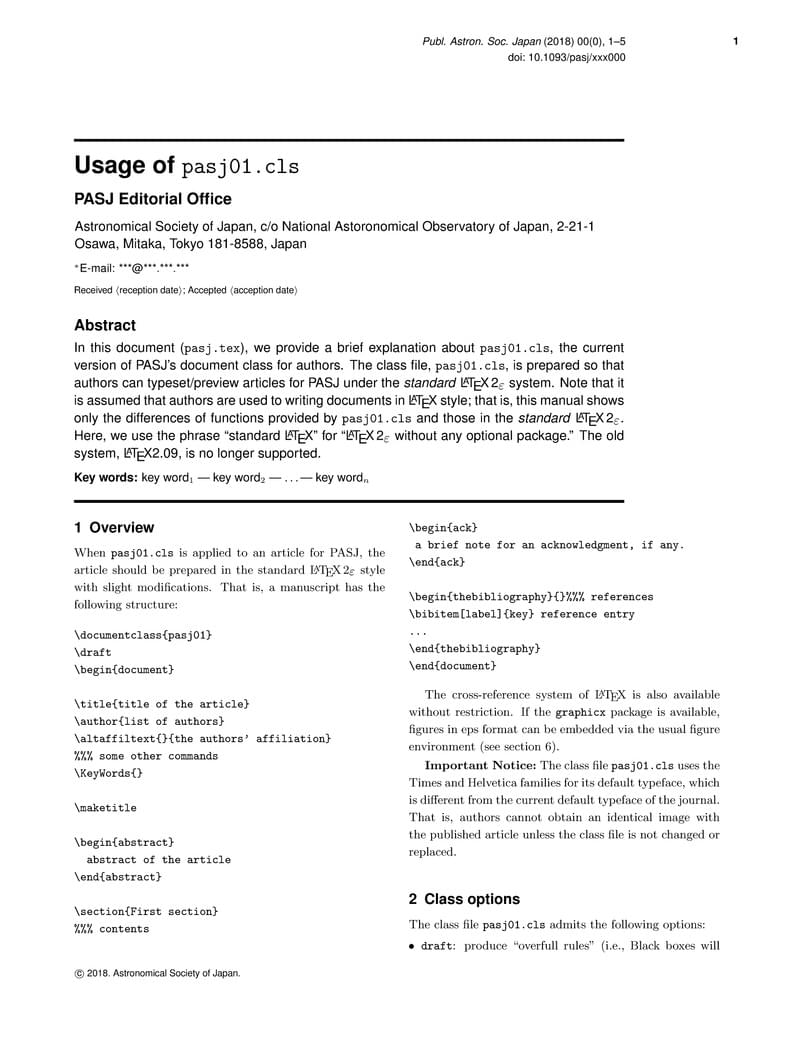
The Journal of Logic and Computation aims to promote the growth of logic and computing, including, among others, the following areas of interest: Logical Systems, such as classical and non-classical logic, constructive logic, categorical logic, modal logic, type theory, feasible maths. The bulk of the content is technical scientific papers, although letters, reviews, and discussions, as well as relevant conference reviews, are included. For more information about the journal, see http://pasj.oxfordjournals
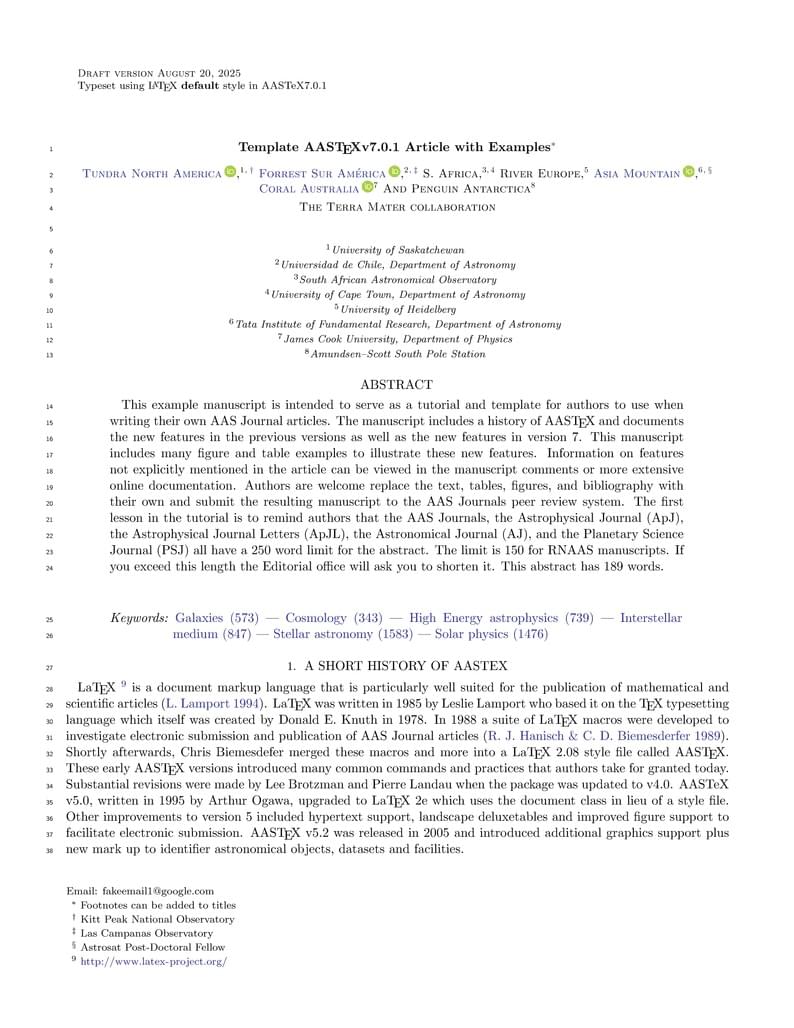
The American Astronomical Society (AAS) has developed a markup package to assist authors in preparing manuscripts intended for submission to all the AAS-affiliated journals. The journals are the Astrophysical Journal (ApJ), the Astronomical Journal (AJ), ApJ Supplements (ApJS), Letters (ApJL), The Planetary Science Journal (PSJ), and Research Notes of the American Astronomical society (RNAAS). The latest LaTeX classfile is AASTeX v7.0.1 and it can be obtained here. This is a bug fix for v7. The sample701.tex template uses this classfile to illustrate some of the newer features for submissions to the main Journals. Authors should consult the extensive guide for all the features in AASTeX v7+ Once your manuscript is complete, check the AAS journals pre-submission checklist to make sure you're ready to submit. Then use the "Submit to Journal" option in the Overleaf editor to submit your files directly to the journal for processing. Note that you will still need to log on to the submission site to supply additional meta-data. The transfer to the peer review site can take some time so please be patient. The editorial office will contact you when your submission has been processed and is ready for the final meta-data input. If you're new to LaTeX, check out our free online introduction to help you get started, or please get in touch if you have any questions.
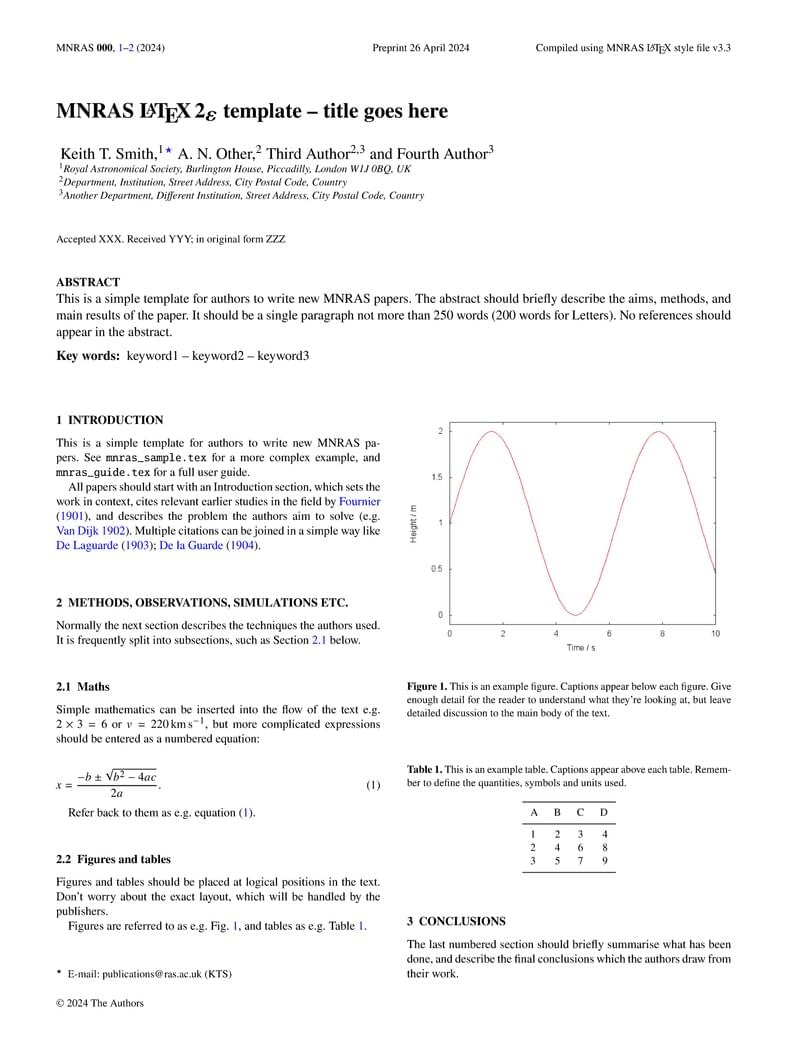
This is a template and guide for preparing papers for Monthly Notices of the Royal Astronomical Society using the 'mnras' LaTeX package. See the mnras_template.tex file (included and used by default when opening the template) for a simple template to help you get started. The mnras_guide.tex file (also included) provides instructions for using the additional features in the document class. This is not a general guide on how to use LaTeX, and nor does it replace the journal's instructions to authors.
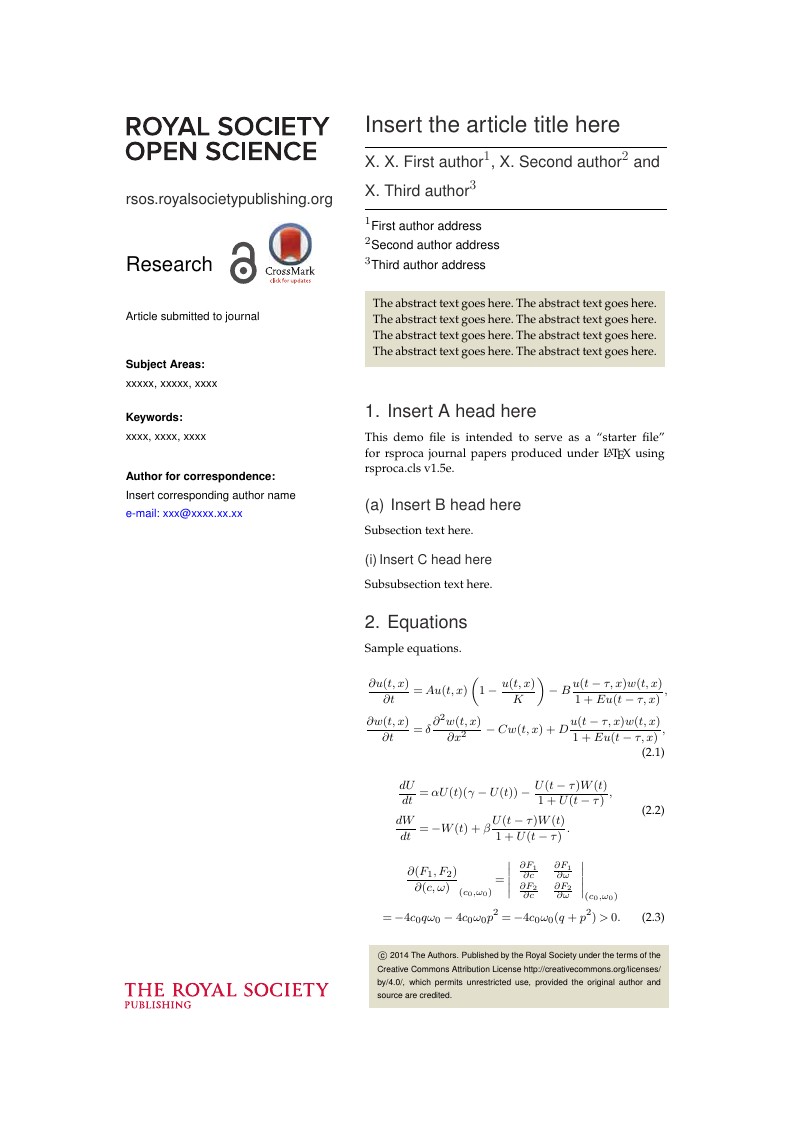
This is the LaTeX template for the Royal Society Open Science – a fast, open journal publishing high quality research across all of science, engineering and mathematics.
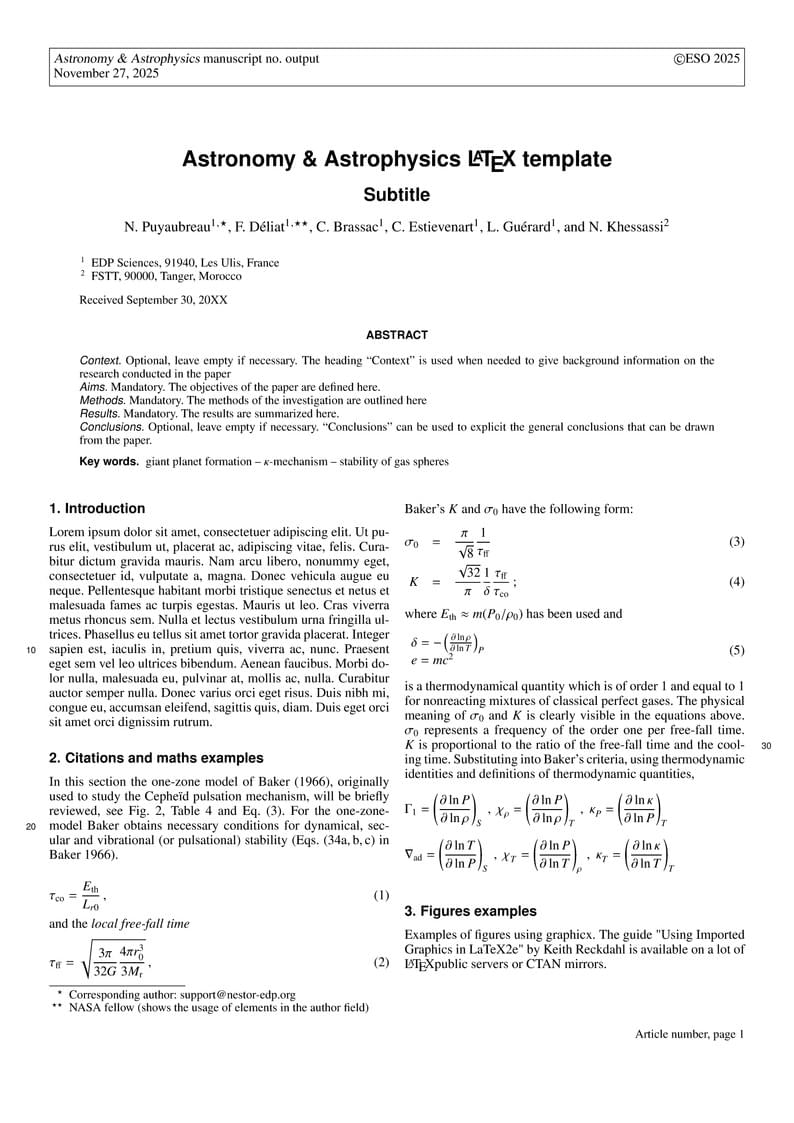
A&A LaTeX macro package v9.3 downloaded from https://www.aanda.org/for-authors 9.3 October 2025 - Behaviour of the [longauth] command is modified to shift the whole author list and affiliations after references.
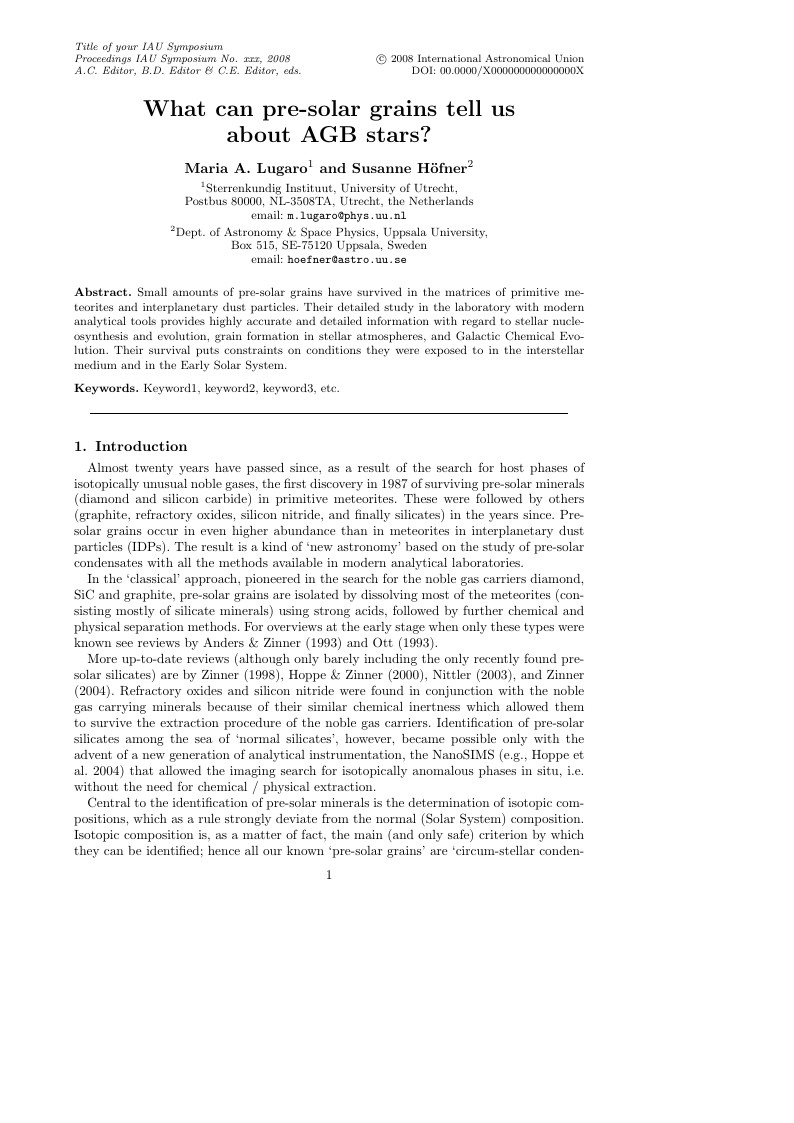
A Latex template for the preparation of IAU Symposia Proceedings downloaded from http://www.iau.org/static/scientific_meetings/authors/. The package contains: Class File (iau.cls), Instructions, a Sample PDF and a Sample TeX file
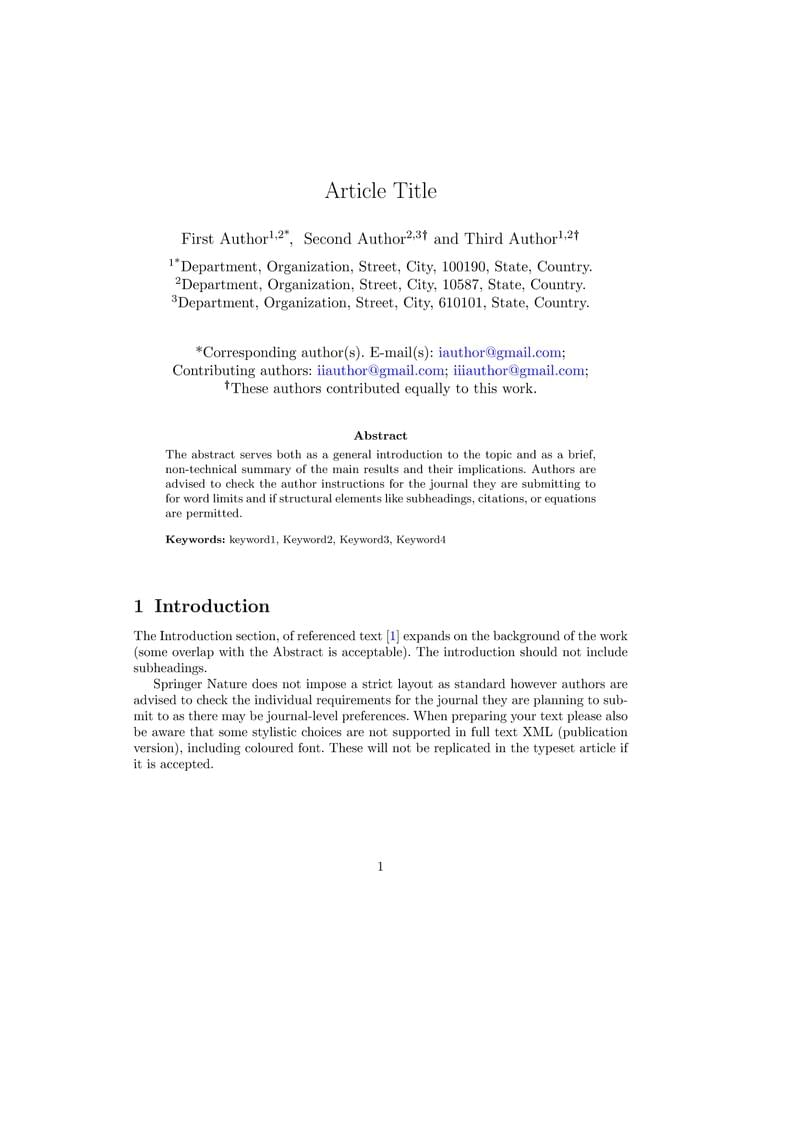
The official Springer Nature authoring template for LaTeX submissions. The template takes a content first approach with minimal formatting. It is designed to promote editorial policy best practice and contains options to help authors meet journal-level requirements. Latest update: December 2024.
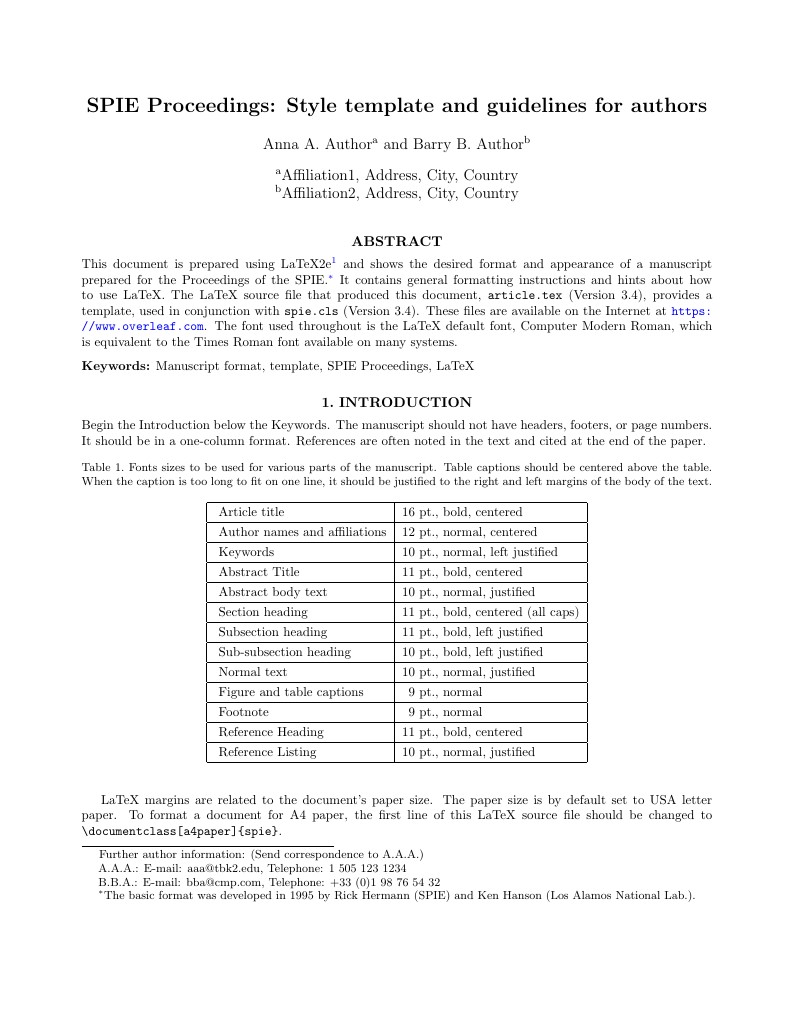
This template is for authors submitting a manuscript to SPIE Proceedings based on an oral or poster presentation at an SPIE conference. The Overleaf template allows authors to write, edit, and collaborate online. Authors can then submit the paper to SPIE Proceedings by downloading the PDF and source files generated from Overleaf. Detailed information about submitting a manuscript to SPIE Proceedings can be found at http://spie.org/x14105.xml. If you're new to Overleaf and LaTeX, check out our free introductory course for help getting started.
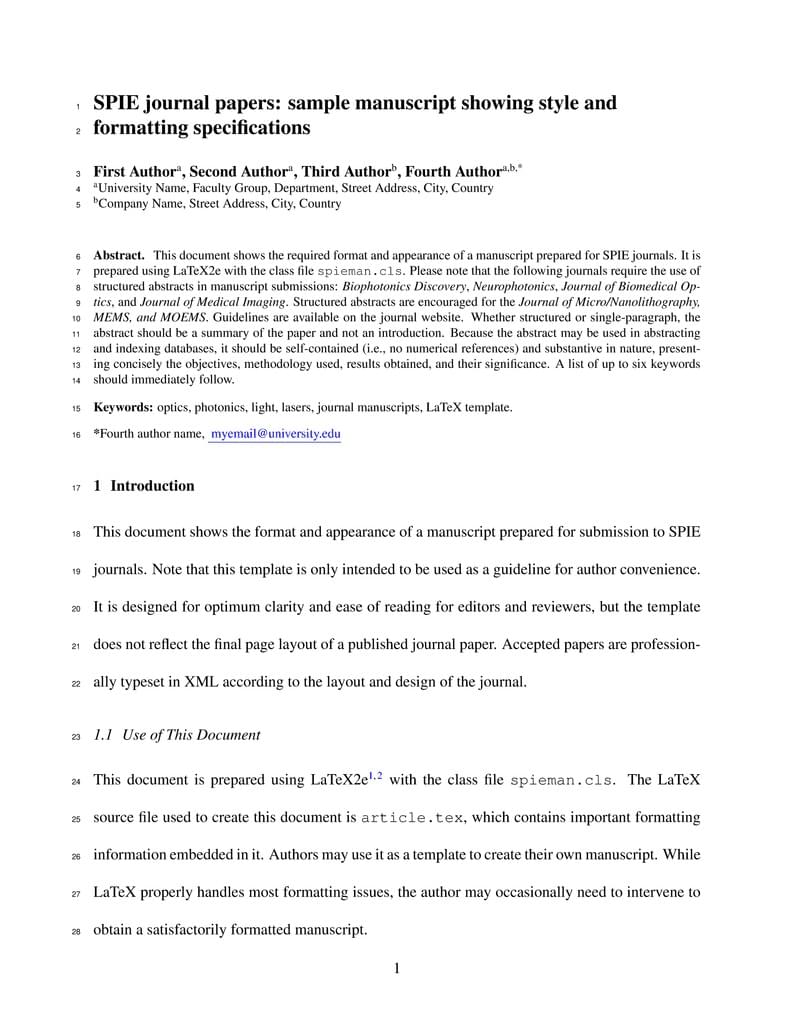
This template is for authors submitting a manuscript to an SPIE journal. The Overleaf template allows journal authors to write, edit, and collaborate online. Authors can then submit the paper to an SPIE journal by downloading the PDF and source files generated from Overleaf. Detailed author guidelines for SPIE journals can be found at http://spie.org/AuthorGuidelines.
FAQ & Help
What is COIN?
The Cosmostatistics Initiative (COIN), an international working group built under the auspices of the International Astrostatistics Association (IAA), aims to create an interdisciplinary environment where collaborations between astronomers, statisticians and machine learning experts can flourish.
COIN is designed to promote the development of a new family of tools for data exploration in astrophysics and cosmology. The group is led by Rafael S. de Souza and researchers willing to join are welcomed to contact him at rafael.2706@gmail.com.
What is Overleaf?
Overleaf is an online collaborative writing and publishing tool. It allows you to collaborate online with coauthors and greatly simplifies the process of creating and writing a LaTeX document. Overleaf's custom templates allow authors to submit their papers directly to many journals and repositories via Overleaf, including the arXiv.
How can I sign up for my free Overleaf Professional Account?
If you're already a member of COIN, you should have automatically received an invite to the email address you used to register with COIN. If this invite hasn't arrived (please check your spam folder), please get in touch and we'll look into it for you.
What's a "Pro" account, and what happens when the one-year period is over?
At the end of the one-year trial, you may choose to continue as Overleaf Pro subscriber (current cost $8/mo), or your account will revert to the Overleaf Free plan. Any data or papers saved in Overleaf will continue to be accessible.
Special Awards: After the end of the first year, 10 award extensions of the Pro account will be granted to those users who have been particularly active in promoting and using the Overleaf platform.
For more information about the different Overleaf plans, please see this page, and if you have any questions about this please let us know.
Who created the artwork used in the portal image on this page?
The artwork in the image above is by Sandbox Studio, Chicago with Kimberly Boustead. The image was originally featured in an article in Symmetry Magazine on The Rise of Astrostatistics, which interviews Joseph Hilbe, the founding President of the International Astrostatistics Association which sponsors the Cosmostatistics Initiative.
More
Quick links to Overleaf integration guides
- Linking your Mendeley account, for quick import of your Mendeley reference library.
- Work offline with Git: how to sync your Overleaf projects using Git.
- See also How to synchronize an Overleaf LaTeX paper with a Github repository (external).
- How to create plots and figures with Plot.ly and import them into your Overleaf projects.
- How to make your paper citable and trackable by publishing to Zenodo.
- How to publish your projects on figshare to get an instant DOI.
- How to import your references from Zotero.
- How to setup an auto-backup using Overleaf → Dropbox → BitBucket (external).
More resources from the Cosmostatistics Initiative
Please visit the Cosmostatistics Initiative website for more information and a list of other useful resources and services.